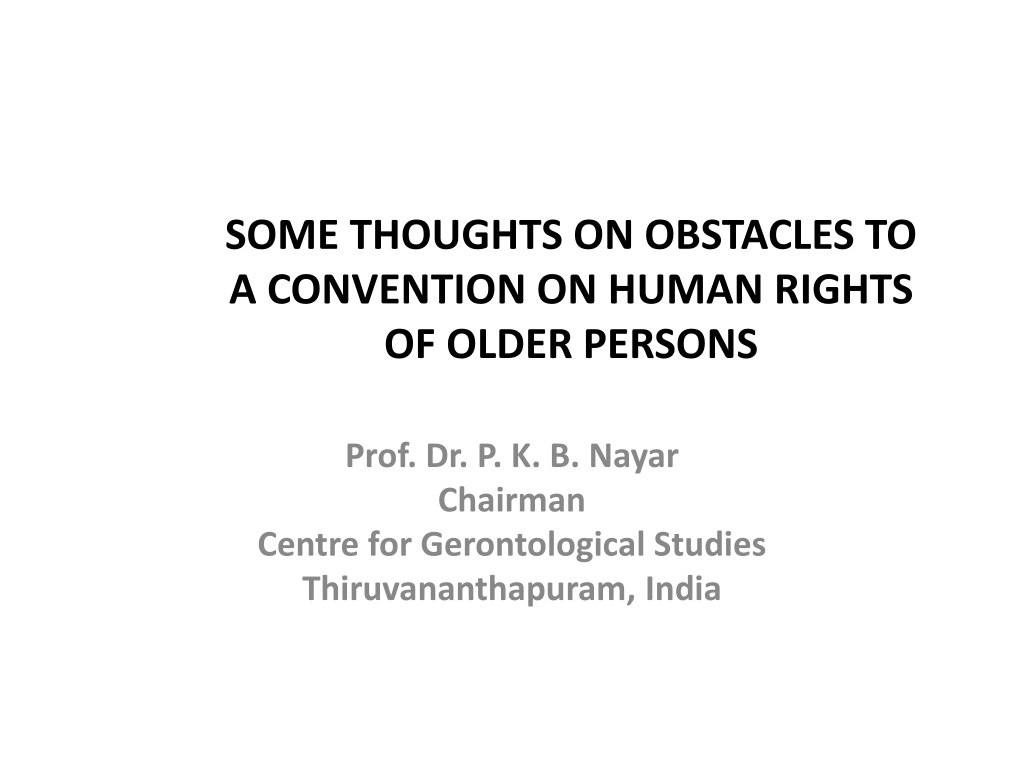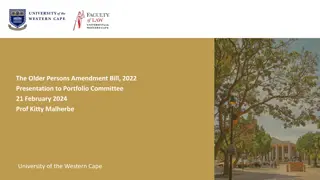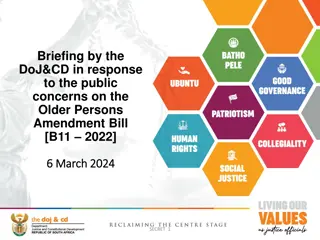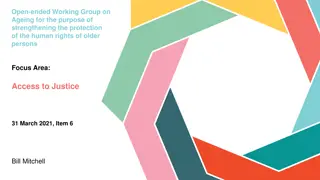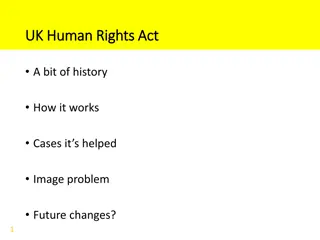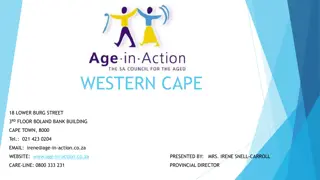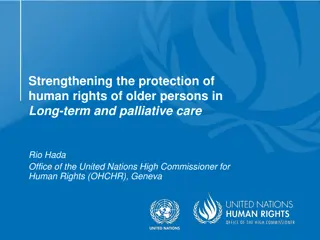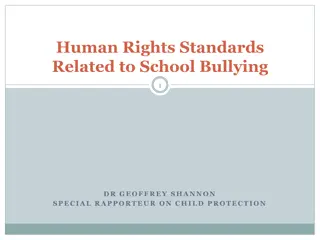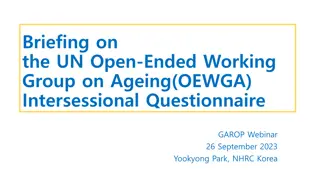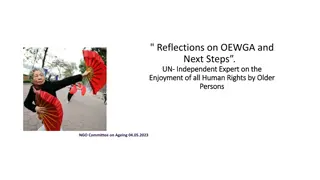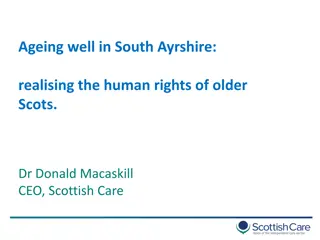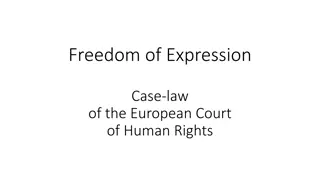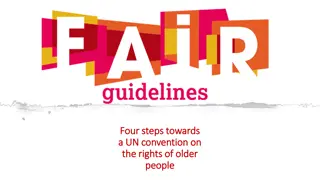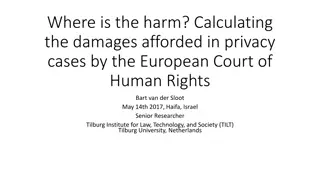Challenges to Establishing a Convention on Human Rights of Older Persons
Challenges in developing a convention for human rights of older persons include lack of clear documentation, low awareness among the elderly, violations within families that often go unnoticed, and cultural barriers hindering the recognition and reporting of violations.
Download Presentation

Please find below an Image/Link to download the presentation.
The content on the website is provided AS IS for your information and personal use only. It may not be sold, licensed, or shared on other websites without obtaining consent from the author. Download presentation by click this link. If you encounter any issues during the download, it is possible that the publisher has removed the file from their server.
E N D
Presentation Transcript
SOME THOUGHTS ON OBSTACLES TO A CONVENTION ON HUMAN RIGHTS OF OLDER PERSONS Prof. Dr. P. K. B. Nayar Chairman Centre for Gerontological Studies Thiruvananthapuram, India
Background Older persons human rights has a history of at least 32 years. First mention by UN in 1982 at the World Assembly on Ageing at Vienna, then clarified through the Declaration of the Principles of Older Persons in 1991. UN Continued to exhort Member Nations on this from time to time At the 2ndWorld Assembly on Ageing, Madrid 2002 it again came out in a more vehement manner. Meanwhile conventions were organized in the different regions of the world passing resolutions addressing UN to enact a convention on the subject.
Contd Regional Level The Congo Committee on Ageing, Oct. 2008 Organisation of American States 2010 OECD Country level Australia, Argentina, Malaysia, Canada NGO level HelpAge International AARP Global Alliance for Rights of Older People an alliance of 9 major international organizations working for the cause of the aged
Contd CGS organized a regional conference in June 2012 for Asia Pacific Region where no such move had been made so far. On its part, UN continued to embark on the same theme. In 2010, UN appointed an Open Ended Working Group on Ageing entrusting the work to this body. The Working Group met 4 times but could not come to a consensus on the matter
What are the impediments? Older person human rights are shrouded in obscurity for several reasons. Absence of a document at any national or international level on what these rights are Even when vague notions exist on the subject, like those passed by UN in 1991 and 2002, there is no provision on how it can be claimed or enforced in case of violation or threat of it. Most older persons are illiterate or less educated and so they are not aware of even the human rights of ordinary citizens, let alone their own rights and how to claim them
Impediments Contd. The lion s share of the violation of older persons human rights occurs inside the four walls of the family. So these violations do not become visible. This is part of domestic violence but very difficult to identify. The old are not willing to divulge this kind of violation of their rights by kin for several reasons cultural and personal and so the violations remain unobserved and unreported. From the cultural point of view, many of the violations are not considered violations per se when they are related older persons who are supposed to bear with many of them without protest. Definitions of violence also change according to situations.
Impediments contd. From the personal point of view, the old themselves do not want to bring this to public attention for 2 reasons. (1) Shame that the kin insulting the parent (2) Social consequence to the son being punished for violation of any criminal act on the father Poverty and deteriorating health compel many old persons to be dependent on their kin. So they cannot afford to complain when their rights are violated by these kin care givers. This is true cross-culturally. Studies have shown that when an old person is totally dependent on the carers, he/she will not be able to protest against any ill treatment meted out to him/her. This is for fear of withholding further service by the provider.
Ageism Society considers many types of indignities and ill treatments of older persons as normative. The presence of ageism makes things worse Ageism suggests that old people have many handicaps and cannot claim their rights as fully as a normal person. Ageism condones many forms of violations of HROP Ageism promotes and perpetuates elder abuse In fact, ageism is universal and is the single major factor that stands in the way of HROP
A re-look at the problem Human rights of older persons have to be viewed against this background. The fact that the old require another set of human rights different from that existing for the general population cannot be disputed. There exist many special human rights covenants for identified groups because of their vulnerable position women, children, disabled, prisoners of war and so on. Why not one for older persons?
Contd Old people are more vulnerable; they cannot fight back as the younger people. This fact has been only vaguely accepted. In spite of several regional and country level conventions on the human rights of older persons, things have not moved to a level where positive action on a covenant could emerge Violations of HROP will fall in the category of abuse and neglect. Ill health, poor economic base, lack of empathy from others, affectivity towards kin, negative attitude from others all stand in the way This is the reason for the UN Open Ended Working Group on Ageing not being able to arrive at a consensus even after four sessions.
HROP an imperative need Since elder abuse is on the increase, violation of elder rights also should be considered as on the increase. Studies on elder abuse show that there is no end to this social malady We will be observing the WEAAD on June 15. This is another indication that elder rights violation is on the increase. International Network for Prevention of Elder Abuse (INPEA) is also working against abuse on elders. Global Alliance for Rights of Older Persons is the newest entrant for the cause of older people s rights All these suggest the imperative need for a convention on the rights of older persons.
Why we need a convention? There is imperative need for a convention on the rights of older persons This is to ensure dignity to older people. A convention will work as a strong anti ageism, anti discriminatory and main-streaming tool. It will persuade member countries to enact protective laws on older people. It will help NGOs to come out more openly for championing the cause of older persons It will to a great extent arrest the increasing trend at elder abuse at the family and societal levels.
How to achieve a convention Participating countries should put more pressure on the UN OEWG on Ageing. Member states could, on their own, enact laws incorporating the rights of older persons. Some countries already have strict laws on elder abuse (UK, USA, Australia, Scandinavian countries) Empowering the old through appropriate economic and health measures could enable at lest older persons with visibility to come forward to enforce their rights. In the last analysis, there should be social acceptance that the old are as much part of society as the rest of the population and discrimination on any ground will be unacceptable and unethical.
